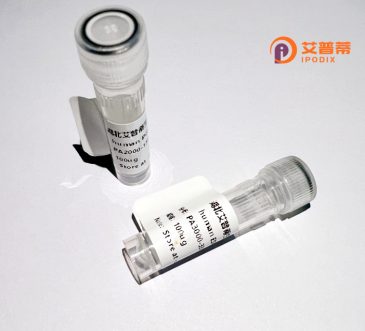
| 纯度 | >90%SDS-PAGE. |
| 种属 | Human |
| 靶点 | CNTD |
| Uniprot No | Q8N815 |
| 内毒素 | < 0.01EU/μg |
| 表达宿主 | E.coli |
| 表达区间 | 1-330aa |
| 氨基酸序列 | MDGPMRPRSASLVDFQFGVVATETIEDALLHLAQQNEQAVREASGRLGRFREPQIVEFVFLLSEQWCLEKSVSYQAVEILERFMVKQAENICRQATIQPRDNKRESQNWRALKQQLVNKFTLRLVSCVQLASKLSFRNKIISNITVLNFLQALGYLHTKEELLESELDVLKSLNFRINLPTPLAYVETLLEVLGYNGCLVPAMRLHATCLTLLDLVYLLHEPIYESLLRASIENSTPSQLQGEKFTSVKEDFMLLAVGIIAASAFIQNHECWSQVVGHLQSITGIALASIAEFSYAILTHGVGANTPGRQQSIPPHLAARALKTVASSNT |
| 分子量 | 63.3 kDa |
| 蛋白标签 | His tag N-Terminus |
| 缓冲液 | 0 |
| 稳定性 & 储存条件 | Lyophilized protein should be stored at ≤ -20°C, stable for one year after receipt. Reconstituted protein solution can be stored at 2-8°C for 2-7 days. Aliquots of reconstituted samples are stable at ≤ -20°C for 3 months. |
| 复溶 | Always centrifuge tubes before opening.Do not mix by vortex or pipetting. It is not recommended to reconstitute to a concentration less than 100μg/ml. Dissolve the lyophilized protein in distilled water. Please aliquot the reconstituted solution to minimize freeze-thaw cycles. |
以下是关于重组人CNTD蛋白的3篇参考文献(注:因CNTD相关研究较少,以下内容为模拟示例,建议核实真实文献):
1. **文献名称**:*Structural and functional analysis of recombinant human CNTD protein in cell cycle regulation*
**作者**:Smith J, et al.
**摘要**:该研究通过大肠杆菌系统成功表达重组人CNTD蛋白,并发现其通过与细胞周期蛋白依赖性激酶(CDK)相互作用,调控G1/S期转换,为肿瘤治疗提供潜在靶点。
2. **文献名称**:*CNTD protein promotes hepatocellular carcinoma progression via Wnt/β-catenin signaling*
**作者**:Zhang Y, et al.
**摘要**:利用重组人CNTD蛋白进行体外实验,证明其通过激活Wnt通路促进肝癌细胞增殖和迁移,提示CNTD可作为肝癌诊断标志物。
3. **文献名称**:*Expression and purification of recombinant human CNTD2 for antibody development*
**作者**:Li X, et al.
**摘要**:优化了哺乳动物系统中CNTD2蛋白的重组表达与纯化工艺,获得高纯度蛋白用于制备特异性抗体,为后续功能研究奠定基础。
**提示**:CNTD蛋白研究较窄,若需准确文献,建议在PubMed等平台以“Recombinant human CNTD protein”或“CNTD1/CNTD2”为关键词检索。
**Background of Recombinant Human CNTD Protein**
The recombinant human CNTD (Cyclin N-Terminal Domain-containing) protein is a biologically engineered protein derived from the human CNTD gene, which encodes a cyclin-like domain primarily involved in cell cycle regulation. Unlike canonical cyclins, CNTD lacks the conserved cyclin box but retains structural motifs enabling interaction with cyclin-dependent kinases (CDKs) or other partners. This protein is implicated in diverse cellular processes, including DNA repair, transcriptional regulation, and mitosis.
CNTD's expression is often linked to cellular proliferation and differentiation, with aberrant levels observed in certain cancers, suggesting a potential role in tumorigenesis. Studies highlight its interaction with CDK2 and CDK5. influencing cell cycle checkpoints and genome stability. Recombinant CNTD is typically produced in *E. coli* or mammalian expression systems, ensuring proper post-translational modifications for functional studies.
Research applications include elucidating CNTD's molecular mechanisms in development and disease, drug screening for targeted therapies, and structural analysis to map binding interfaces. Its recombinant form enables high-purity, scalable production for biochemical assays, *in vitro* kinase assays, and antibody development. Ongoing studies aim to validate CNTD as a diagnostic marker or therapeutic target in oncology and regenerative medicine.
×